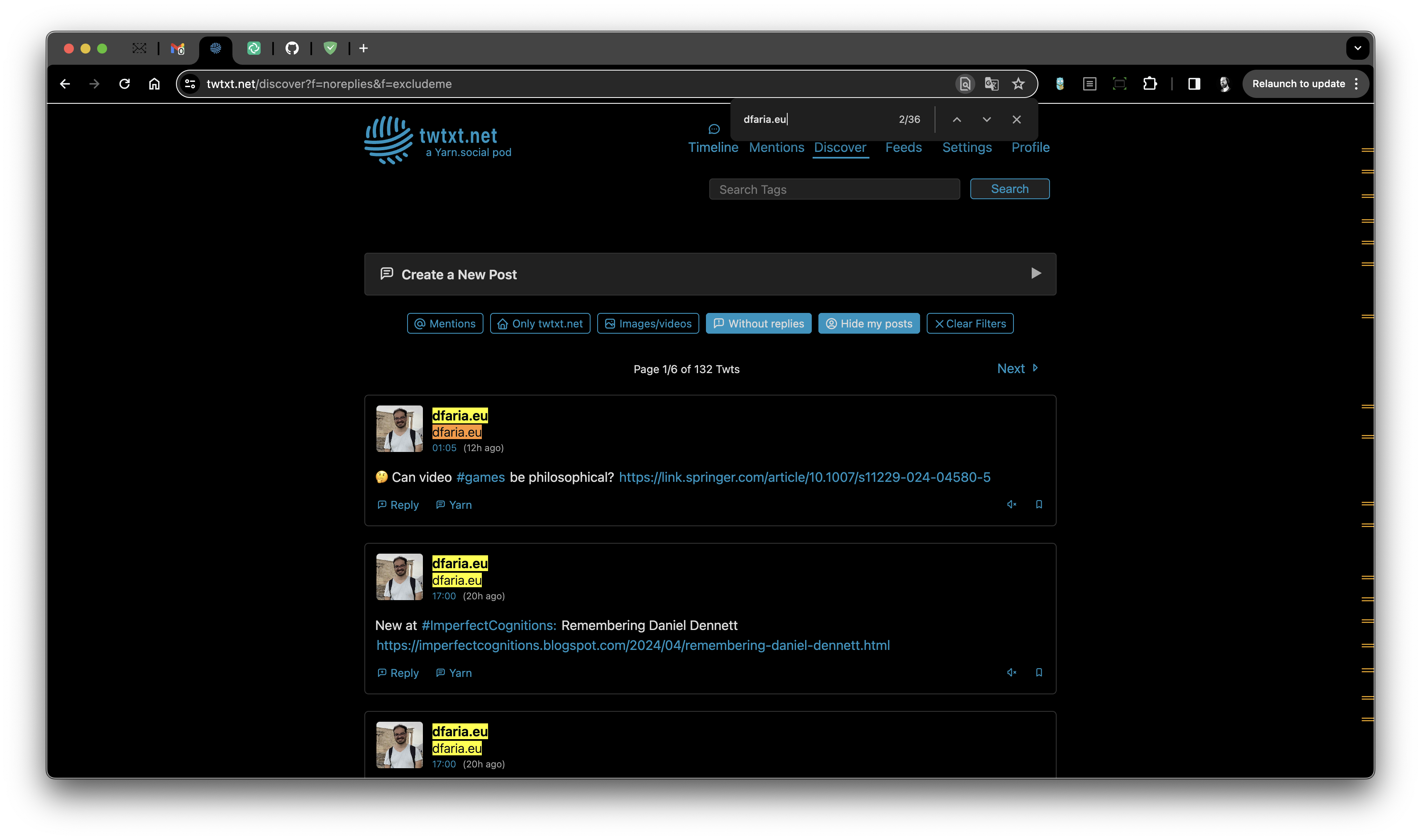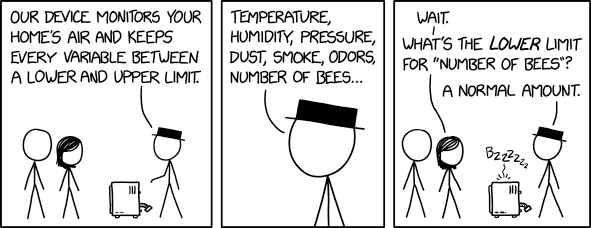@shinyoukai@neko.laidback.moe Do we now need ad filters in twtxt clients, too? O_o I hope not! Personally, I cannot stand the “Sent with my crappy $phone/$app” e-mail footers.
But congrats on your client. :-)
@itsericwoodward@itsericwoodward.com Nice to see someone else also participating! 🥳
(Btw, they don’t want us to share our inputs: https://www.reddit.com/r/adventofcode/wiki/faqs/copyright/inputs/ Yeah, it’s a bit annoying. I also have to do quite a bit of filtering on my repo …)
Anyone on my pod (twtxt.net) finding the new Filter(s) useful at all? 🤔 
@prologic@twtxt.net @movq@www.uninformativ.de Same here, I give each service a dedicated e-mail address. It’s very interesting to see how e-mail addresses are transferred to other actors. Luckily, this only happens rarely. But it does happen. In surprising ways.
Aliases not only help to fight spam, but are also a great way to specify filter rules to sort e-mails.
I have a Python script that transforms the original YouTube channel Atom feed into a more useful Atom feed by removing the spam description and replacing it with the video duration, filtering out videos by title, duration, etc. I just updated it to exclude the damn Shorts garbage more efficiently. Finally, YouTube updated their Atom feed generation, so that the video URL contains /short/ if it’s of this useless kind. Never thought that they ever actually will improve their Atom feeds. Thank you, much appreciated!
Meh, the stupid shorts get longer. I need to increase my duration filter in order to ban all this garbage.
@lyse@lyse.isobeef.org Oooooh, never seen that before. 😲 Either white-balance doing funny stuff or unusual “filtering” through those clouds. 🤔
Honestly for these types of services, there probably isn’t much point, as the layer4 module in Caddy doesn’t do inspection/filtering anyway I think? 🤔
I’m also thinking of adding eye-off icon next to every Twt that, when clicked, hides that feed (tooltip: “Hide this feed”). This would work with the filters as a “temporary additive filter” to restrict/control the current view.
I’m thinking of bringing back filters (this time not as a feature flag, just baked in): New filters: Hide Feed, Hide Bots, Hide News, Media Only, No Replies, Local Only — toggle to trim noise & surface the Twts you care about.
Also spent the morning continuing to think about a new design for EdgeGuard’s WAF. I’m basically going to build an entirely new pluggable WAF that will be designed to only consider Rate Limiting, IP/ASN-based filtering, JavaScript challenge handling, Basic behavioral analysis and Anomaly detection.
The only part of this design I’m not 100% sure about is the Javascript-based challenge handling? 🤔 I’m also considering making this into a “proof of work” requirement too, but I also don’t want to falsely block folks that a) turn Javascript™ off or b) Use a browser like links, elinks or lynx for example.
Hmmm 🧐
En estos momentos, no sé si un dios le está pidiendo que libere su pueblo felino o está mirando una paloma
/https://duque-terron.cat/media/photos/IMG_4312.jpeg) #catsoftwtxt
#catsoftwtxt
@bender@twtxt.net Exactly. I suspect it was because of sqlitebrowser also accessing the database in parallel to debug the original issue.
So far, I have not found the exact reason why some replies don’t show up. When I do not filter for unread messages and show all, though, I actually see them. So, there’s that.
@bender@twtxt.net I was a bit confused at first what that is: Apparently, it’s the source code of Altair BASIC: https://gizmonaut.net/soapflakes/EXE-199711.html
(Of course they have a user agent filter. 😂 Can’t download that PDF with wget.)
“it is very easy to filter or ignore it” This is the interesting part for legacy clients, hehe
Joking aside, let’s see how it works in the wild!
@eapl.me@eapl.me I think the benefits do not outweigh the disadvantages. Clients would have to read and merge the information from 2 txt and a new metadata would have to be added with the address of this file.
Also, it is very easy to filter or ignore it.
@andros@twtxt.andros.dev I’m all for elegant solutions. I prefer when the computer helps me to really achieve my goal and solve it completely, not where I still have to manually filter a list by hand. Anyway. :-)
@eapl.me@eapl.me Yeah, you need some kind of storage for that. But chances are that there’s already a cache in place. Ideally, the client remembers etags or last modified timestamps in order to reduce unnecessary network traffic when fetching feeds over HTTP(S).
A newsreader without read flags would be totally useless to me. But I also do not subscribe to fire hose feeds, so maybe that’s a different story with these. I don’t know.
To me, filtering read messages out and only showing new messages is the obvious solution. No need for notifications in my opinion.
There are different approaches with read flags. Personally, I like to explicitly mark messages read or unread. This way, I can think about something and easily come back later to reply. Of course, marking messages read could also happen automatically. All decent mail clients I’ve used in my life offered even more advanced features, like delayed automatic marking.
All I can say is that I’m super happy with that for years. It works absolutely great for me. The only downside is that I see heaps of new, despite years old messages when a bug causes a feed to be incorrectly updated (https://twtxt.net/twt/tnsuifa). ;-)
FreeBSD and hi-fi audio setup: bit-perfect, equalizer, real-time
A complete guide to configuring FreeBSD as an audiophile audio server: setting up system and audio subsystem parameters, real-time operation, bit-perfect signal processing, and the best methods for enabling and parameterising the system graphic equalizer (equalizer) and high-quality audio equalization with FFmpeg filters. Linux users will also find useful information, especially in the context of configuri … ⌘ Read more
I received a tad over four hundred e-mails during my three and a half weeks vacation. That’s actually really good, I expected way more. It just would have been nice if some bot e-mail addresses hadn’t changed and hence slipped through my sorting filter rules in the first place.
@prologic@twtxt.net No I’m not trying to standardize the domains themselves xD I was just hinting at filtering cases where nick is identical to a level of a domain; in order to show shorter format nicks within clients, i.e: @nick.domain.ltd or @nick.ltd instead of a @nick@nick.domain.ltd or @nick@nick.ltd. Just like what @sorenpeter@darch.dk already did with the nick = domain case. (unless I’m missing the point)
Yes it work: 2024-12-01T19:38:35Z twtxt/1.2.3 (+https://eapl.mx/twtxt.txt; @eapl) :D
The .log is just a simple append each request. The idea with the .cvs is to have it tally up how many request there have been from each client as a way to avoid having the log file grow too big. And that you can open the .cvs as a spreadsheet and have an easy overview and filtering options.
Access to those files are closed to the public.
Been curious to see if can filter out my access.log file and output a list of my twtxt followers just in case I’ve missed someone … I came up with this awk -F '\"' '/twtxt/ {print $(NF-1)}' /var/log/user.log | grep -v 'twtxt\.net' | sort -u | awk '{print $(NF-1) $NF}' | awk '/^\(/' spaghetti monster of a command and I’m wondering if there’s a more elegant way for achieving the same thing.
So I’ve flattened my work and private email inboxes to single inbox folders and I don’t even know anymore what I was thinking before trying frantically to organise everything in sub folders. Labels and search filters are the way forward.
Some more arguments for a local-based treading model over a content-based one:
The format:
(#<DATE URL>)or(@<DATE URL>)both makes sense: # as prefix is for a hashtag like we allredy got with the(#twthash)and @ as prefix denotes that this is mention of a specific post in a feed, and not just the feed in general. Using either can make implementation easier, since most clients already got this kind of filtering.Having something like
(#<DATE URL>)will also make mentions via webmetions for twtxt easier to implement, since there is no need for looking up the#twthash. This will also make it possible to make 3th part twt-mentions services.Supporting twt/webmentions will also increase discoverability as a way to know about both replies and feed mentions from feeds that you don’t follow.
@prologic@twtxt.net on the the timeline with mentions filter I missing the latest mention that comes up in the mentions page.
Oh.. And you are mentioning my dev instance here 😄
Bloom Filter
 ⌘ Read more
⌘ Read more
@prologic@twtxt.net hmm… it sounds like being stuck in a “Filter bubble”. 🤔
# follow = dbucklin@www.davebucklin.com https://www.davebucklin.com/twtxt.txt?nick=dbucklin
I fixed it by adding (?<!\S) to the regex filter. But what is going on with the ?nick=dbucklin anyhow?
Hah 🤣 @dfaria@twtxt.net Your @dfaria.eu@dfaria.eu feed really does consume about >50% of a “Discover” search with filters “Without replies” and “Hide my posts”. 🤣 
36/2 = 18 at 25 Twts per page, that’s about ~72% of the search/view real estate you’re taking up! wow 🤩 – I’d be very interested to hear what ideas you have to improve this? Those search filters were created so you could sift through either your own Timeline or the Discover view easily.
And now added #filter for replies too: 
The rain washes the air so the rain can be crusty as it filters the dirt away
What about using the blockquote format with > ?
Snippet from someone else’s post
by: @eapl.me@eapl.me
Would it not also make sense to have the repost be a reply to the original post using the (#twthash), and maybe using a tag like #repost so it eaier to filter them out?
Noise Filter
 ⌘ Read more
⌘ Read more
Air Handler
 ⌘ Read more
⌘ Read more
@movq@www.uninformativ.de Perfect! Setting the display_filter did the trick. I have come across that SE yesterday while looking for answers, but I wanted to make sure there was nothing else I was missing to notice. Thanks! @quark@twtxt.netbros.com (#spngeda) Hmm, that’s mostly an issue of how mutt displays the Date header. The index should already display local time, only the pager shows the raw header: https://movq.de/v/8c92fff081/s.png To be honest, I’d like to keep it that way (i.e., Date stores the original stamp as it occured in the twtxt feed). To convince mutt to show local time here, you’d probably have to use display_filter: https://unix.stackexchange.com/a/516101